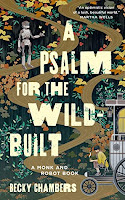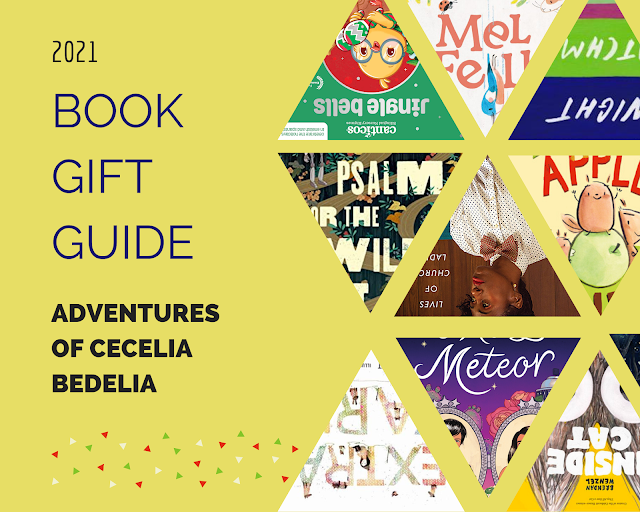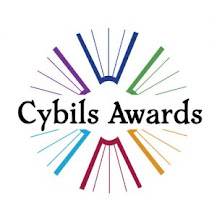I know the title of this post and the banner call this is a gift guide, but it's really more of a "books I gifted this year, in case you're still searching for ideas." I didn't have myself together well enough to put anything together early in the season, but there are still a couple of days left for holiday shopping, so... It's organized by age range, as that seemed to make the most sense, and I may have a couple of words about the books, but unless I've done a full review links go back to Goodreads.
Caveat: This isn't a list of the best books of the year, and not all of these books were even published this year! It's just a list of books I thought would make good gifts.
Board books for babies (ages 0-2):
B is for Baby by Atinuke, illustrated by Angela Brooksbank - A board book all about the letter B, featuring a family in an African village.
Into the Forest by Laura Baker, illustrations by Nadia Taylor - A layered board book that grows increasingly more complex, with a forest creature theme.
Jingle Bells / Navidad: Bilingual Nursery Rhymes by Susie Jaramillo - My most-gifted board book this year! I love the accordion style, lift-the-flap interactive elements of Jaramillo's bilingual board books!
Picture books for littles (ages 3-5):
Extra Yarn by Mac Barnett, illustrated by Jon Klassen - A sweet and funny fable for modern times. I picked it up because Barnes & Noble was doing a special, and ended up going back for more copies.
In the Garden by Emma Giuliani - An oversized picture book that outlines the growing process in the garden. Gorgeously-designed!
Inside Cat by Brendan Wenzel - A hilarious caper about a cat who lives indoors -- charming, original, and thought-provoking!
Mel Fell by Corey R. Tabor - I found this one on a "best of 2021" guide and they were not wrong! An interactive (the book turns! which way is up??) adventure about a bird taking a leap and learning to fly.
Graphic novels early readers (ages 6-7):
Apple of My Pie by Mika Song - The second in a series, this funny, illustration-heavy graphic novel following a pair of manic squirrels has been a hit with everyone I've introduced to it!
Bear by Ben Queen, illustrated by Joe Todd-Stanton - A seeing-eye dog loses its sight and must regain its purpose in this graphic novel that reads a bit like a movie, complete with danger, twists, and turns!
Mayor Good Boy by Dave Scheidt, illustrated by Miranda Harmon - An excellent bridge book between picture books and graphic novels, with vocabulary suitable for very early readers.
+1 for a slightly older elementary school kid (ages 8-12):
Mel the Chosen by Rachele Aragno - A girl goes on a magical adventure -- and the highlight is the interesting, detailed art style!
Books for the teen crowd (ages 13-18):
I Was Their American Dream by Malaka Gharib - My high school students and I read and enjoyed this graphic novel memoir that tackles big ideas like identity, microaggressions, multi-cultural families, and more.
Miss Meteor by Tehlor Kay Mejia and Anna-Marie McLemore - A book club pick from this past year, and my choice for a 13-year-old cousin who is having fun with makeup and dances.
For adults:
A Psalm for the Wild-Built by Becky Chambers - My pick for my dad, who liked the first in the Murderbot series and is a big gardener. It's probably a little progressive for him, but I think he'll enjoy this novella's brevity and its ode to the out of doors.
Elder Race by Adrian Tchaikovsky - My adult brother likes to read fantasy and sci-fi, and I think he'll enjoy this one. It's a bit cerebral and plays with ideas of loneliness and connection.
The Night Watchman by Louise Erdrich - For my 102-year-old grandmother who likes reading books set in the past, and enjoys well-reviewed literary fiction.
The Secret Lives of Church Ladies by Deesha Philyaw - An excellent all-around pick: short, incisive, award-winning collection of short stories. This one is going to my aunt.
Which books did you gift this year?

















